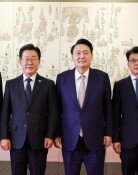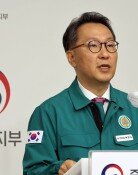Experts Analyze North Korea Policies
Experts Analyze North Korea Policies
Posted November. 23, 2006 06:49,
Prior to the resumption of six-party talks, a forum on the future of North Korea was held under the co-sponsorship of the Korea Society and Asia Society in New York yesterday (local time).
At the forum, experts on the Korean peninsula expressed cautious optimism on resolving the Norths nuclear issue. Some claimed that the international community should fully cooperate and be patient in order to defuse North Koreas nuclear crisis.
Chinas Role Is Getting Attention-
Former U.S. Principal Deputy Assistant Secretary of State for East Asian and Pacific Affairs Evans Revere, who visited Pyongyang many times and is an experienced negotiator with North Korea, said that he was surprised to see a changed China.
Revere analyzed, The main reason North Korea returned to the six-party talks is because China, which signed a treaty of amity with the North, supported the UN resolution imposing sanctions on North Korea two times at the UN Security Council, and the pressure on the North by international community was greater than any other time.
Revere then further suggested diplomacy, flexibility, solidarity, commitment and patience as the five key words to resolve the Norths nuclear issue.
US, ABC Approach Wont Solve the Issue-
A professor at Hunter College in New York and an expert on North Korea, Donald Zagoria, maintained that there are many problems with the so-called ABC (Anything But Clinton) policy, in which U.S. President George W. Bush completely reversed the policy on North Korea pushed by Bill Clinton administration upon taking office.
Zagoria noted, North Korea is fundamentally responsible for the deteriorated Norths nuclear development program issue, but the rigid attitude by the Bush administration is another major reason for the issue to have gotten worse, and added, Former State Secretary Henry Kissinger also agreed that the current administration should change its policy on North Korea at an informal meeting designed to find a resolution to the Norths nuclear standoff.
Professor Zagoria further noted, North Korea, too, should renounce its self-isolating policy for its long-term survival and face up to the reality that it should be part of an international community.
If the Norths Real Intention Is to Possess Nuclear Arms-
Columbia University professor Gerald Curtis expressed concerns, saying, We still have no way to know the exact intention of the North Koreas nuclear test but, if the Norths ultimate goal is to possess nuclear weapons beyond just as a leverage to use at talks, the situation gets very complicated.
Professor Curtis remarked, Nuclear armed North Korea is a grave threat to the security of Northeast Asia so all the countries concerned should try to prevent it from happening, and said, If North Koreas final goal is to become a nuclear power, the U.S. alone cant solve it and it needs Chinese cooperation.
Meanwhile, Curtis, an expert on Japan, said, when I met former Japanese Prime Minister Junichiro Koizumi before he retired from office, he expressed regrets that he failed to normalize diplomatic ties with North Korea while he was in office, and forecasted that Prime Minister Shinzo Abe, on the other hand, will have no option but to stick to a hard-line policy before resolving the issue of Japanese civilians abducted by the North in its relationship with North Korea since he rose to Prime Minister position on the back of popularity of issuing the kidnapped Japanese civilian affairs.
U.S. Should Review Sending Special Envoy to North Korea-
Leon Sigal, a director of the Northeast Asia Cooperative Security Project at the Social Science Research Council in New York, said, Moral obligation sometimes matters in diplomatic, and proposed that President Bush consider sending senior special envoy for North Korea to Pyongyang as some Republicans say he should so.
At the same time, Sigal criticized that fanaticism of both Washington and North Korea complicated the Norths nuclear crisis.
Sigal contended, The U.S. threatened the North with political isolation and financial sanctions to eliminate North Koreas nuclear weapons, but only stimulated North Koreas nuclear development program. North Korea, for its part, pushed for missiles and nuclear tests to secure its regime security but it only made China, its most important ally, join the resolution calling for sanctions against the North Korea at the UN Security Council, let alone it failed to make the U.S. change its course.
kong@donga.com






